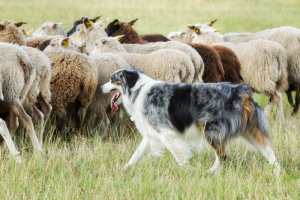June 26, 2024

Tax Deductions for Pet Owners
Tax Deductions for Pet Owners – What Dog Owners Need to Know in Australia
Owning a dog brings immense joy and companionship, but it also comes with a myriad of expenses. Especially when the cost-of-living crisis has no signs of improving in the short term.
In Australia, while most pet-related costs are considered personal expenses and are not tax-deductible, there are some circumstances where you might be able to claim deductions for your dog. This guide provides an in-depth look at these potential tax benefits and how to navigate them effectively.
Service Dogs and Assistance Animals
Service dogs, also known as assistance dogs, are trained to help individuals with disabilities, offering both practical assistance and emotional support. The expenses incurred in acquiring, training, and maintaining a service dog can be substantial. Fortunately, the Australian Taxation Office (ATO) allows deductions for these costs under certain conditions:
- Medical Expenses Deduction:
- If you have a service dog for a medical condition, you can claim the costs as medical expenses. This includes the initial cost of the dog, training fees, food, veterinary care, and other maintenance expenses. The range of deductible expenses is broad, encompassing everything necessary to ensure the dog’s ability to perform its duties.
- To qualify, you need a medical certificate verifying that the dog is necessary for managing your medical condition. This certification should come from a recognised healthcare professional who clearly states the nature of your condition and the specific role the dog plays in managing it.
- Work-Related Deductions:
- If your service dog assists you in performing your job, you may be able to claim work-related expenses. For instance, if the dog is used for mobility assistance at work or for other specific tasks that facilitate your ability to perform your job, the costs of maintaining the dog could be deductible.
- Keep detailed records of all related expenses and ensure you have documentation to support the necessity of the service dog for your job. This includes any correspondence with your employer or occupational therapist outlining how the dog aids your work performance.
Guard Dogs and Business Use
If you use a dog for business purposes, such as a guard dog for a warehouse or a dog that is integral to a farm operation, some expenses may be deductible. These deductions recognise the dog’s role in protecting assets or assisting in business activities.
- Guard Dogs:
- For businesses that use dogs to protect their premises, the cost of purchasing, training, and maintaining a guard dog can be claimed as a business expense. This includes the cost of specialised training to ensure the dog is capable of performing its duties effectively.
- Ensure the dog is clearly used for business purposes and keep thorough records of all expenses. The ATO may require evidence that the dog is indeed serving a protective function and not simply a personal pet.
- Farm Dogs:
- Dogs used in farming activities, such as herding or protecting livestock, can also be considered business expenses. These dogs perform essential roles in many agricultural operations, making their upkeep a legitimate business cost.
- You can claim deductions for costs such as food, veterinary care, and training related to the dog’s role in your farming operations. It’s important to maintain a clear distinction between personal pets and working dogs, particularly if you have multiple dogs on your property.

Specific Scenarios and Examples
Understanding the nuances of when and how you can claim deductions for dog-related expenses can be complex. Here are some specific scenarios and examples to illustrate potential deductions:
- Security Firms: A security company uses trained dogs for patrolling client properties. The expenses for training, feeding, and maintaining these dogs are fully deductible as they are integral to the business’s operations.
- Sheep Farming: A sheep farmer employs several dogs to help with herding and managing livestock. The costs associated with these working dogs, including veterinary care and food, are deductible business expenses.
- Therapy Dogs in Workplaces: An office employs a certified therapy dog to improve employee well-being and reduce stress. The maintenance costs of the therapy dog can be deductible if the business can demonstrate the dog’s positive impact on employee productivity and mental health.
Record Keeping and Documentation
To claim any deductions for your dog, meticulous record-keeping is crucial. Proper documentation ensures that you can substantiate your claims if the ATO requires proof. Here’s what you should keep track of:
- Receipts and Invoices: Maintain all receipts and invoices for expenses related to your dog, including food, veterinary bills, training costs, and any other maintenance expenses. Digital records can be particularly useful for organisations and easy access.
- Medical Documentation: If claiming a deduction for a service dog, ensure you have a medical certificate and any other relevant documentation from your healthcare provider. This should include detailed information on your condition and how the dog assists in managing it.
- Work-Related Proof: For work-related deductions, keep records of how the dog assists you in your job and any correspondence or documentation from your employer. Detailed logs of the dog’s activities and contributions to your work can strengthen your claim.
- Business Use Evidence: For guard dogs and farm dogs, document the dog’s role in your business and keep records that demonstrate its use for business purposes. This might include training certifications, job descriptions, and photos of the dog at work.
Common Pitfalls and How to Avoid Them
When claiming tax deductions for dog-related expenses, it’s important to be aware of common pitfalls that can lead to denied claims or penalties. Here are some tips to avoid these issues:
- Mixing Personal and Business Expenses: Ensure a clear separation between personal and business expenses. For instance, if you have both pets and working dogs, maintain separate records for each.
- Lack of Documentation: Incomplete or missing documentation is a common reason for denied claims. Keep all relevant paperwork organised and readily accessible.
- Overestimating Deductions: Only claim deductions for expenses that are directly related to the dog’s work or service role. Overestimating or inflating expenses can attract unwanted scrutiny from the ATO.
Conclusion
While the ATO does not allow deductions for typical pet ownership expenses, there are specific scenarios where dog-related costs can be claimed. Service dogs, guard dogs, and farm dogs are primary examples where tax deductions may apply.
Always consult a tax professional to ensure you meet the criteria and maintain proper documentation to support your claims. By understanding and utilising these deductions, you can help offset some of the costs associated with your canine companion, making it more feasible to provide the best care for them while also managing your finances effectively.